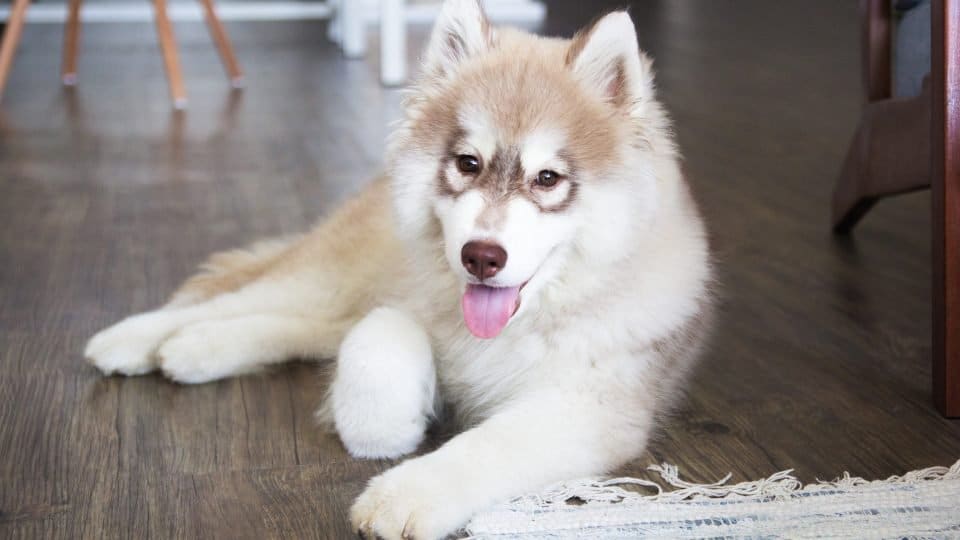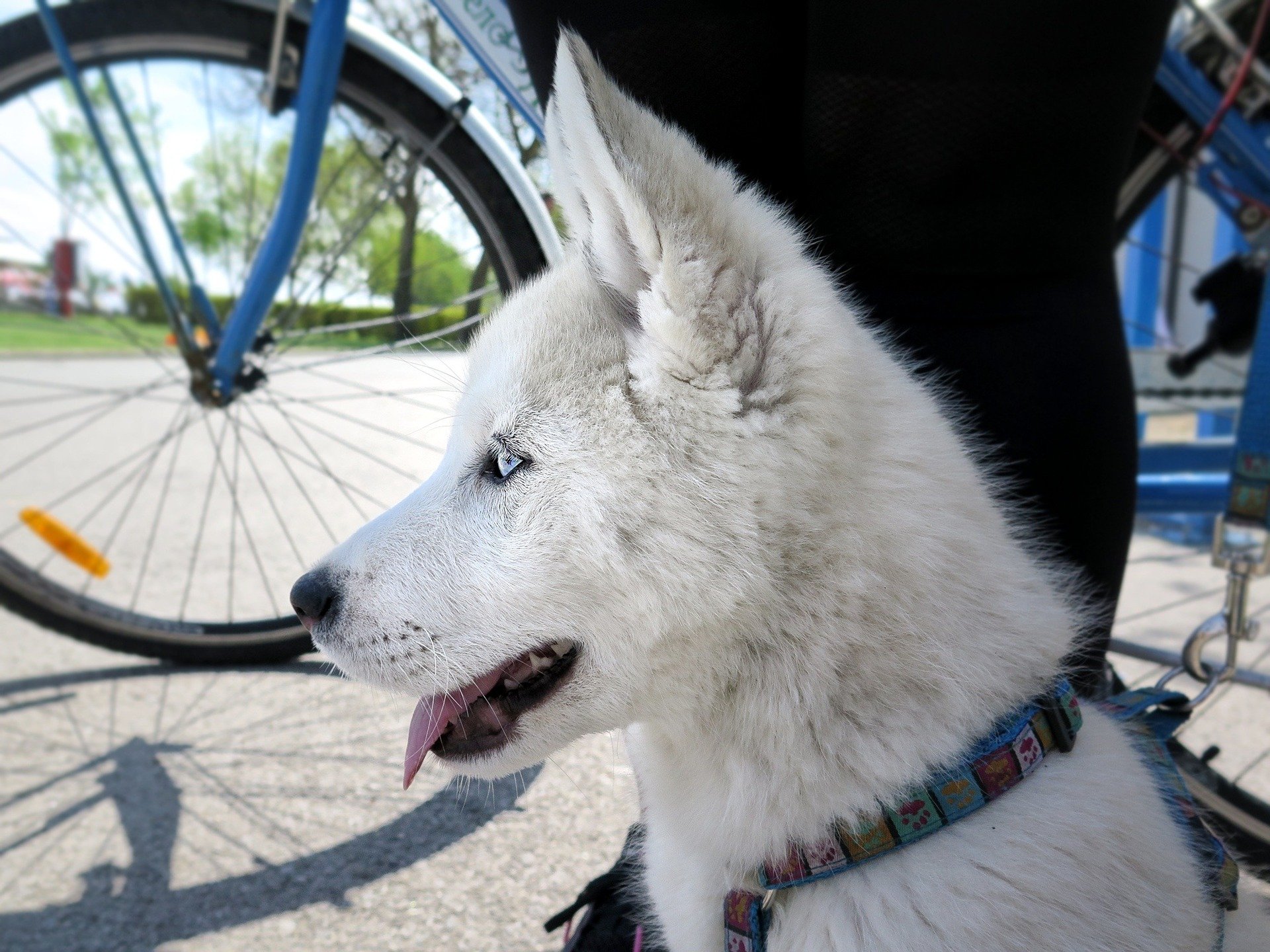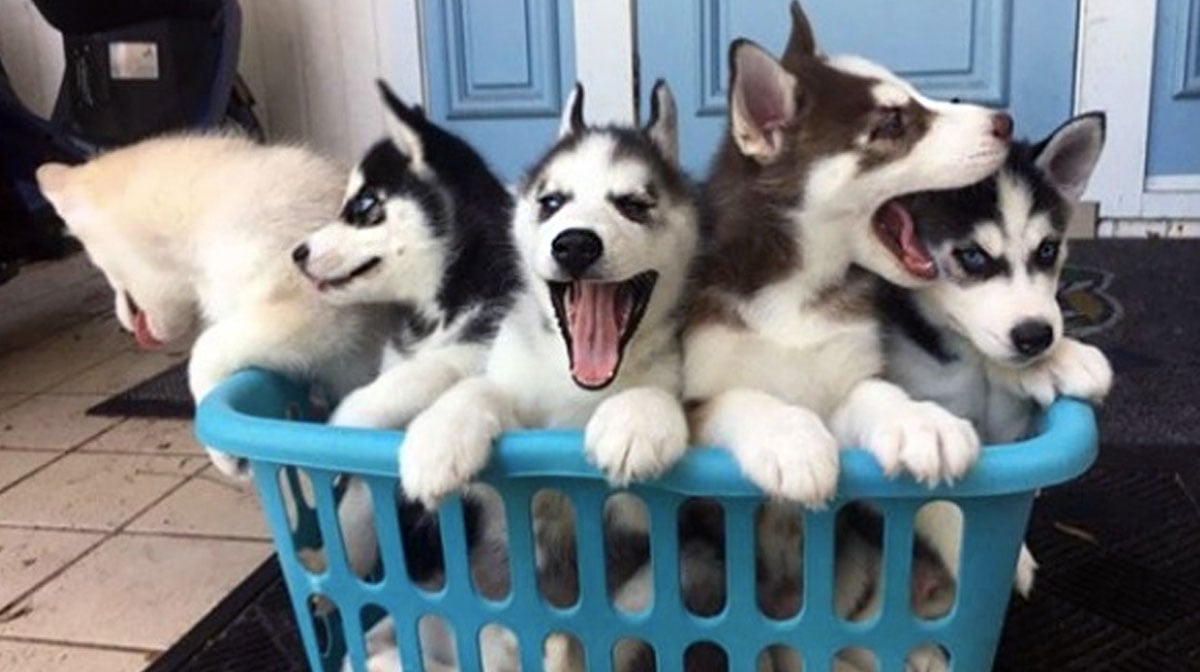Even from a distance, there’s no mistaking a husky puppy when you see one. With iconic blue or brown (or a mixture of both colours!) eyes and the thick snow-like fur, huskies are stunning animals. When they’re in puppyhood, however, they are still learning the ropes. Sometimes too smart for their own good, husky puppies need plenty of activities and enjoy the family life to keep them occupied. They were born to be pack dogs, after all!
Directly related to the Alaskan malamute, Siberian huskies are slightly smaller in stature, but with many of the same characteristics. In Siberia, huskies were used for transporting things over great distances in the Chukchi tribe. In 1909, the first Siberian huskies were brought to Alaska as racing dogs.
Huskies have notoriety beyond the great white north. In 1925, the most famous Husky Balto saved many from dying by leading a team of sled dogs 700 miles to bring diphtheria serum to a remote Alaskan community. There is a statue erected of brave Balto in Central Park, New York.
Husky puppy facts
There’s a reason why actor Ben Stiller has his best husky friend, Alley, and Miley Cyrus adored her favorite husky pup, Floyd. Husky puppies have many cute quirks to celebrate daily!
| Size | Medium. Males get up to 20-27kg (45-60 pounds) and have a height at the shoulder of 53-60cm (21-23.5 inches), while females are a little smaller at 16-23kg (35-50 pounds) and 50-56cm (20-22 inches) tall. |
| Breed Characteristics | Huskies are in the working class group and very light on their feet. With a combination of thick white, grey and brown fur, they are meant for the great outdoors and can get overheated easily in the summer, though it is not recommended to shave this furry breed. They have a gait that is very confident and smooth and much like their sleigh dog ancestors, they are able to carry light loads over huge distances. |
| Temperament | Is that a husky or a fox? Sometimes you may see a mischievous expression on your husky, as they are smart and problem-solving animals. They can be consummate escape artists, able to dig or climb over obstacles to roam to their heart’s content. They love being a part of a pack, and usually get along with other kinds of dogs and humans.
Due to this, don’t expect much of a watchdog. Not all dogs are meant to be guards! |
| Grooming and Health Needs | As puppies and adults, husky fur is self-cleaning, meaning they may only need a handful of baths a year. However, brushing them weekly, especially during the summer months, is pivotal in helping keep their coat and skin healthy. Because huskies have an undercoat, they tend to shed large amounts twice a year. One should “rake out” the old coat with a metal or pin comb as needed. Keep them cool in summer, read these tips to find out how.
Though huskies are a healthy breed, pay special attention to their nails. If the nails aren’t cut properly, they can develop serious foot problems. As a puppy, they should be checked regularly for juvenile cataracts as well. |
| Training | Like most breeds, huskies benefit from early socialisation with other dogs and humans, along with obedience training. Huskies are very social creatures and need a lot of attention in regards to other dogs and people.
Being left alone all day isn’t emotionally healthy for huskies, so having another dog or a person at home most of the day is ideal. Frequent stays at a Rover.com sitter’s who provides dog boarding may also help. |
| Energy Level | Huskies have an extreme urge to run, and run fast! Be sure to provide a fenced in area for them to run free and get the excess energy out. Due to this, they should not be off-lead when not in a fenced area.
They need exercise regularly and can adapt to city life easily, as long as they have playgroups and off-lead areas to roam. |
| Life Span | 12 – 14 years |
Who is the best human for a Husky?
Husky puppies and adults need quite a bit of attention. They are social and friendly and require some furry and human friends with interaction on a frequent basis. Don’t leave your husky puppy home alone for too long, as it can cause antisocial behaviors and acting out later in life. These are puppies that directly benefit from dog boarding or a trusted dog walker while you’re away from home.
As pack animals, huskies love to be in a family environment. Ideally, they have a fenced backyard to roam free in, as they have a strong desire to run regularly. Huskies need to be on the lead and need to learn early to walk beside you. It’s important that you are the leader of this pack!
Alaskan Husky vs. Siberian Husky puppies
You may have noticed that there are two kinds of Huskies, Siberian and Alaskan. Siberian Huskies are breed recognised by the Kennel Club and follow a strict set of breed standards, while Alaskan Huskies have been bred solely as working dogs and don’t follow breed rules.
Both share very similar builds and personalities, though Alaskan Huskies may have a larger range of height and weight depending on if they were mixed more heavily with Malamutes or other breeds.
Getting a Husky puppy
Choosing to adopt or go through a breeder for your new husky puppy is a personal choice that requires research. Thankfully, there are many resources out there to help you find a rescue or breeder that offers healthy, ethically-sourced husky puppies.
Knowing what you’re in for when you get a husky puppy is an important step in being a responsible pet owner. Whether you find a responsible breeder or are planning on adopting, it’s up to you to be prepared for an energetic and friendly addition to your household.
Adopting Husky puppies
It may be surprising to know, but adopting a husky puppy is possible. There are many rescues dedicated to the Siberian husky out there, as well as others that have both Siberian and Alaskan huskies.
Most breed rescues report that a majority of their rescue dogs come from individual owner surrender, with the most common reasons being a change in lifestyle or the breed not being right for them. This means that there may be many dogs and puppies out there that are looking for a new forever home.
The main difference between a breeder and a rescue is that a rescue may not always have young puppies to choose from. The benefit, however, is that most are mandated to only adopt out dogs that have been microchipped and spayed/neutered. This means you may end up with a dog that’s already been housebroken, and doesn’t need these common medical procedures. You may also find a Husky mix that has all the traits you want from the breed, but with a little extra thrown in.
Finding a Husky rescue can be as simple as searching the internet. The Kennel Club also has an excellent list of Siberian Husky rescues on their site.
Finding a Husky breeder
The first step is to do your research. Sadly, there are plenty of puppy mills posing as reputable breeders along with many online scams. Be aware, and reach out to different online forums for conversations about getting your future furry family member.
Be sure to ask questions, make arrangements to meet the parent dogs or mother, and follow your gut. If something seems wrong at a breeder you visit, or the husky puppy seems too good to be true, there’s likely something going on. The Kennel Club also offers resources for finding a breeder, with fairly strict guidelines on who they let participate.
Husky puppy resources
After you find the right husky puppy, it’s time to prepare your home! Here are a few resources to get you started:
How Long Can You Leave a Puppy Alone?
Teach Your Puppy to Sleep Through the Night: A Dog Trainer’s Method
Your Puppy’s Emotional Development Month by Month
18 Weirdly Cool Dog Facts Every New Puppy Parent Should Know




